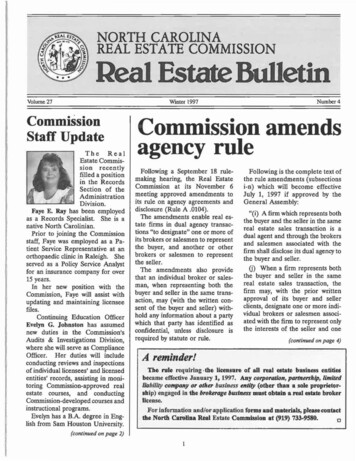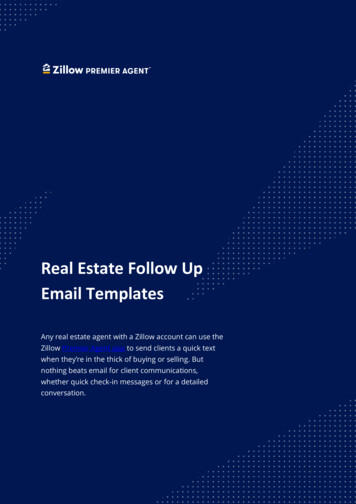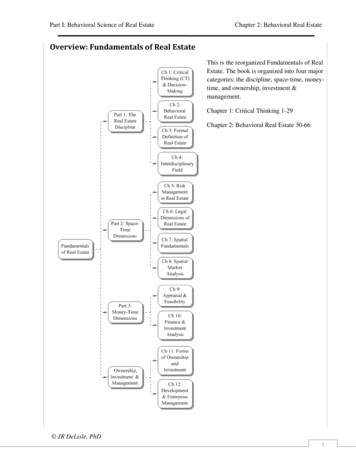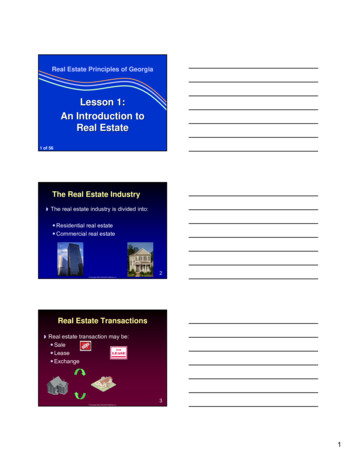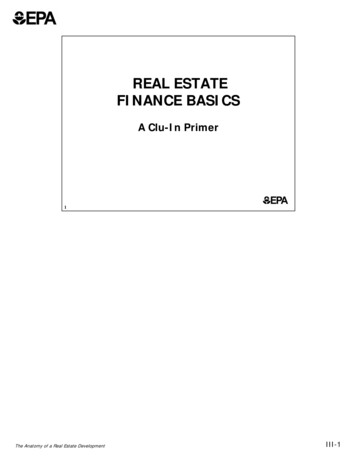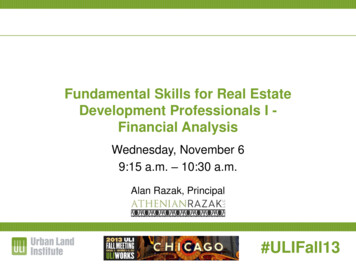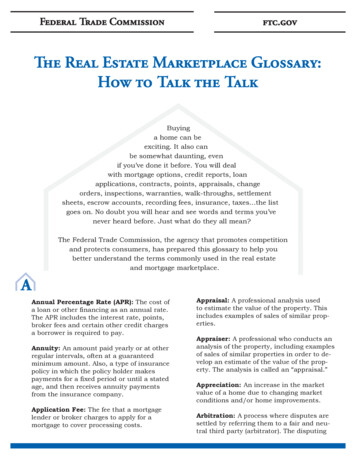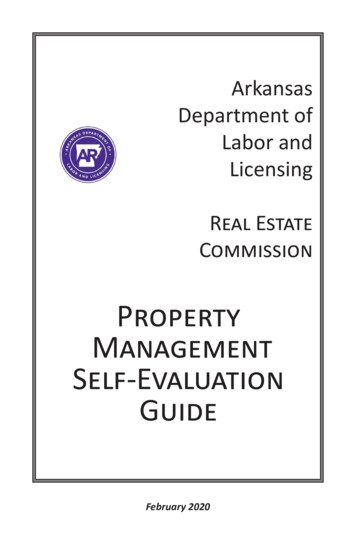
Transcription
ArkansasDepartment ofLabor andLicensingReal uideFebruary 2020
Property ManagementSelf-Evaluation GuideProperty Management activities include the leasing, managing,marketing and overall maintenance of the property of others. PropertyManagement involves more bookkeeping and paperwork than most other areas of real estate practice.AREC Investigators continue to see deficiencies during office examinations of Property Management transactions. That is why this guidewas developed, with input from the AREC Investigators, to assist you in complying with the Real EstateLicense Law and Commission Regulations.This should be used as a guide for Property Management practice in Arkansas. This material applieswhether you are managing one or one hundred properties. Review youroperating procedures with this Self-Evaluation Guide. If you have anyquestions, please contact an AREC Investigator. (See Page 10 for contactinformation.)This Self-Evaluation Guide consists of questions you might finduseful to ask yourself about your practices, policies and procedures regarding Property Management. Review and analyze your own prioritiesin accordance with the Arkansas Real Estate License Law and Regulations.Take a few minutes to answer the questions in the following categories to see how your Property Management policies and proceduresreflect Arkansas Real Estate Law and Regulations.Page 1
Property Management FormsProperty Management Agreement:A contract between the Property Manager (Principal Broker) and ownerof the property which outlines the responsibilities and authority of thePrincipal Broker. Do you have signed current Management Agreements withowners of each and every property that you manage?Lease Agreement:A contract between the landlord and tenant establishing thetenant’s right to use and possess the property according to agreed uponterms and conditions. Do you have current Lease Agreements with each and everytenant of property you manage?Commission Regulation 10.10(a) states:“Except as provided in Regulation 10.10(b), alicensee, for the protection of the public and ofall parties with whom the licensee deals, shallsee that the exact agreement of the partiesregarding real estate is in writing. A licenseeshall also see that clients and other parties tothe transaction with whom the licensee dealsreceive copies of such agreements signed by allparties. (Examples: Exclusive agency agreements or contracts, real estatecontracts, closing statements, lease agreements, management agreements, financial obligations and commitments, etc.) It is strongly recommended that a licensee obtain written acknowledgement from the buyerand/or seller that the buyer and/or seller have received said signed copies.”Page 2
Trust Account, Trust Fundsand AccountingTrust Account:Bank accounts into which trust funds (and only trust funds) are deposited. Is your trust account identified as a “trust or escrow” account?Is your trust account non-interest bearing?Commission Regulation 10.8(c) states:“A principal broker who receives trust funds shall either maintain a separate trust account or shall have an escrow agent for all such trust funds.The principal broker of the firm shall be solely responsible and accountable for all trust funds received by the firm and all deposits to or disbursements from the trust account. The principal brokershall also be responsible and accountable for any fundsdelivered to an escrow agent selected by the principalbroker, but shall not be responsible for funds deliveredto an escrow agent selected by the parties. Except asauthorized by Regulations 10.8 (i) and 12.2, the trustaccount shall be non-interest bearing. The name on theaccount shall include either “trust” or “escrow” andmust be located in an institution insured by either theFDIC or some other insuring agency of the federal government.” Do you reconcile your trust account bank statement monthly?Commission Regulation 10.8 (g)(2) states:“All trust account bank statements shall be reconciled in writing at leastmonthly and balanced to the total amount of trust funds deposited in theaccount which have not been disbursed. Copies of such reconciliationsshall be kept by the broker for at least three (3) years or for such time asmay be required by law, whichever is greater.”Page 3
Trust Funds: Do you deposit trust funds only in your trust account?Commission Regulation 10.8 (a) states:“Trust funds means and includes money or other things of value not belonging to the principal broker but which are received by the principalbroker or any of the principal broker’s licensees in connection with areal estate transaction or real estate activity,including, without limitation, clients’ moneys,earnest moneys, rents, advance fees, deposits,etc. For purposes of the Arkansas Real EstateLicense Law and Commission Regulations, anyfunds deposited in a broker’s trust account arepresumed to be trust funds.” Do you maintain brokers’ funds in the trust account?Commission Regulation 10.8 (d) states:“A principal broker may maintain the broker’s own funds in a designatedtrust account only when they are clearly identified as the broker’s depositand only for the following purposes:1) If the bank in which the account is maintained designates aspecific minimum balance that must be maintained in order to keep theaccount open, the broker may maintain that amount in the account designated as the broker’s funds.2) If the bank in which the account is maintained requires a service charge to be paid for the account, the broker may maintain a reasonable amount to cover that service charge in the account in the broker’sname, provided, however, that such amount shall not exceed the total ofsix (6) months service charges.”Page 4
Security Deposits: Do your lease agreements show the amount of securitydeposits paid by the tenants? Are you holding those security deposits in a trust account?Commission Regulation 10.8 (h)(1) states:“All security deposits made under a rental or lease agreement shallbe deposited in the principal broker’s trust account,including those deposits made on property ownedby any licensee licensed under the principal brokerunless the licensee who owns the property has awritten agreement with the tenant providing thatthe licensee may keep the security deposit in thelicensee’s separate account. A copy of any suchagreement shall be furnished to the principal broker by the licensee.”Rents: Do you deposit rental monies and other funds belongingto the client received into a trust account within three (3)days of receipt? Do you deposit clients’ moneys received or held in reservefor repairs into a trust account?Commission Regulation 10.8 (g)(1) states:“No later than three (3) days following the execution of a real estatecontract by both seller and buyer, all trust funds delivered to the principal broker, shall be either deposited in the trust account, deliveredto an escrow agent, or deposited pursuant to a written agreementby the seller and buyer. All other funds delivered to the broker pend-Page 5
ing performance of any act shall be, no later than three (3) days, either deposited in the trust account, delivered to an escrow agent, ordeposited pursuant to a written agreement by the seller and buyer.Should the third (3rd) day be a Saturday, Sunday, or legal holiday, thenthe third (3rd) day is extended to the next day which is not a Saturday,Sunday or legal holiday. The broker shall maintain an accounting ofall funds delivered to the broker and shall keep a signed receipt forany funds the broker delivers to an escrow agent. The broker remainsresponsible for the funds if the broker selected the escrow agent, butnot if the parties selected the escrow agent. A broker shall at all timeskeep detailed records of all funds coming into the broker’s possessionand all disbursements made by the broker.”Accounting:Owner Summary Statements:An accounting to the owner of rents or otherfunds received, belonging to the owner, and expenses paid from these funds. Do you provide a monthly accounting tothe owner? Do you maintain individual ledgers foreach client, used to record rents or otherfunds received and payments made, and balance due client?Commission Regulation 10.8 (g)(1) states:“.a broker shall at all times keep detailed records of all funds coming intothe broker’s possession and all disbursements made by the broker.”Page 6
Record Maintenance Do you maintain a file containing invoices for all expensescharged to owners for maintenance of their property?Commission Regulations 10.7 (b)(2) and (3) state:“Each principal broker shall maintain complete records pertaining toproperty managed for others. Such records shall include all contracts,financial transactions, receipts, statements, repair estimates and other documents relating to management of theproperty.“All records required by Regulation 10.7 shallbe maintained by the principal broker for three(3) years or such time as may be required bylaw, whichever is greater, and shall be open toinspection by and made available to the investigative staff of the Commission at the firm’soffice or other location designated by the Commission. All records required by Regulation 10.7 may be maintainedin an electronic form provided that a copy of the records can be produced as required by this Regulation.” Do you or does your firm or anyone or any entity relatedto you or your firm profit from maintenance activities performed on properties you manage? Are all profits received by you, your firm, or anyone or anyentity related to you or your firm disclosed in writing to theowner of the property on which services are rendered?Commission Regulation 8.5 (c) states:“When acting as agent in the sale or management of property, a licensee shall not accept any commission, rebate, profit, payment,compensation or other valuable consideration from any source inconnection with the property without full written disclosure to theparty represented by the licensee.”Page 7
Agency Representation Disclosure Do all tenants receive written disclosure that your firmrepresents the owners of the properties?Commission Regulations 8.1 (a)(1) and (2)(b) and (c) state:“In any real estate transaction in which a licensee is acting solely asagent for a seller or lessor, the licensee shall disclose to a potentialbuyer or lessee, or to the buyer’s or lessee’s licensed agent, the licensee’s agency relationship with the seller or lessor. Such disclosureshall be made in a timely manner under the particular circumstancesso as to avoid to the extent possible eliciting or receiving from theprospective buyer or lessee information which would reasonably beexpected to remain confidential and not disclosed to the seller orlessor, such as, for example, information concerning the real estateneeds or motivations, negotiating strategies or tactics, or the financial situation of the potential buyer or lessee.(2) When the disclosure is made to the licensed agent of the buyer orlessee, it is that licensee’s duty to convey the disclosure to the buyer or lessee in a timely manner.(b) In all cases, disclosure shall be in writing, butmay initially be made orally and reduced to writing at a convenient time subject to the requirements of Regulation 8.1 (c). Evidence of the disclosure shall be maintained by the licensee.(c) In all cases, however, such disclosure must be made before thebuyer or lessee signs any document related to the transaction, suchas an offer or lease or rental agreement.”Page 8
Agent-Owned Properties Do agents licensed with your firm own rental properties? Are security deposits paid by tenants of rental properties owned by agents licensed with your firm held inyour firm’s trust account? If not, do you maintain written agreements signed by tenants of rental properties owned by agents licensed withyour firm which authorize the realestate agent / owner to keep the security deposits?Commission Regulation 10.8 (h)(1) states:“All security deposits made under a rental or lease agreement shallbe deposited in the principal broker’s trust account, including thosedeposits made on property owned byany licensee licensed under the principal broker unless the licensee whoowns the property has a written agreement with the tenant providing thatthe licensee may keep the securitydeposit in the licensee’s separate account. A copy of any such agreement shall be furnished to the principal broker by the licensee.Page 9
Property Management Regulations10.18 Property management definitions.(a) “Audit trail” means a documented history of a financial transactionby which the transaction can be traced to its source.(b) “Occupant” means a person who rents a property on a nightly basis.(c) “Tenant” means a person who rents a property on other than anightly basis.(d) “Property Manager” means a licensed principal broker or designated executive broker who performs property management activitiespursuant to A. C. A. § 17-42-103(9)(e) This section does not apply to any residential property management program operated or regulated by a federal or state act or agencywhich includes specific record keeping requirements that the commission determines are substantially equivalent to or greater than that required by this section.10.19 Property management agreement.(a) A principal broker or designated executive broker must not engagein the management of residential rental real estate without a written,current property management agreement between the owner and theproperty manager. A property management agreement must include thefollowing:(1) Name, address and other contact information for property owner;(2) The address or legal description of the property to be managed;(3) The duties and responsibilities of the property manager and owner;(4) The authority and power given by the owner to the property manager;(5) The management fees, application fees, screening fees, rebates,discounts, overrides and any other form of compensation to be receivedby the property manager for management of rental real estate includingwhen such compensation is earned and when it will be paid;(6) A description of the monthly statements of accounting the propertymanager will provide to the owner;(7) The duration of the agreement, rollover provisions, renewal clausesor automatic extensions, if any;(8) The method by which the property management agreementcan be terminated and any other terms and conditions of the agreement;(9) Signatures of the property manager or executive broker andproperty owner; and(10) The date of the agreement.(b) The property manager must promptly deliver a legible copy of thefully executed property management agreement, and any addenda oramendments, to the owner.Page 10
10.20 Tenant agreement.(a) A property manager shall not lease property he manages without awritten agreement with the tenant.(b) Each lease or rental agreement for residential real estatemanaged by the property manager must contain the following:(1) The name and business address of the property manager and hisfirm;(2) The name, address and other contact information of the tenant;(3) The mailing address or unit number of property being rented orleased;(4) Payment conditions and amounts pertinent to the rental or lease,and the rental or lease term;(5) The amount of and the reason for all funds paid by the tenantto the property manager at the outset of the agreement including fundsfor rent, security deposits, and any other fees;(6) The location where or entity by whom security deposits will beheld;(7) Method by which tenant will be notified in the event oftermination of property manager’s property management agreement toinclude handling of tenant’s security deposit; and(8) Signatures of the current property manager or current executivebroker and tenant.(c) A tenant’s refusal to sign the lease agreement shall not constitutenoncompliance by the property manager with the terms stated herein.(d) A property manager may not expend any tenant security depositsfor payment of any expenses or fees not otherwise allowed by the tenant’s rental or lease agreement.10.21 Property management accounting and recordkeeping.(a) A property manager must retain records of all deposits in amanner in which they are traceable to the owners’ and tenants’ ledgers.A property manager must retain records identifying the amount of andpurpose of each disbursement entered into the owner’s and tenants’ ledgers.(b) The property manager shall disclose to the owner, in writing, theproperty manager’s use of any employees or a business in which theproperty manager or any persons licensed under him has a pecuniary interest to provide billable services to the owner’s property.10.22 Property management owner ledgers.(a) A property manager must prepare and maintain at least oneseparate owner’s ledger for each property management agreement, forall monies received and disbursed.(b) If a property is utilized for nightly rentals, a separate ledgeraccount must be maintained for that property. Each occupant of the property must be identified, including the dates of occupancy and amountspaid.Page 11
(c) If a property manager has access to a separate banking orescrow account owned or controlled by the property owner pursuant toa property management agreement, the property manager may maintaineither a record of receipts and disbursements or check register in lieu ofan owner’s ledger.(d) All owner ledgers must contain the property manager’s name,identification of property being managed, and the following informationfor each deposit of funds:(1) The amount of funds received;(2) The purpose of the funds and identity of the person who tenderedthe funds;(3) The check number, cash receipt number or a unique series ofletters and/or numbers that establish an audit trail to the receipt of funds;(4) The date the funds were deposited; and(5) The balance of each recorded entry.(e) For each disbursement of funds, all owner ledgers must containthe following information:(1) The date the funds were disbursed;(2) The amount of funds disbursed;(3) The check number or bank-generated electronic tracking number;(4) The payee of the disbursement;(5) The purpose of the disbursement; and(6) The balance after each recorded entry.(f) If more than one property is managed for a property owner, eachentry for deposit or disbursement must identify the applicable propertyrather than just the owner. If a property management agreement with anowner allows the property manager to use funds collected for one property to apply to expenses of another property owned by the same owner,an overall compilation/accounting shall be prepared for the owner.(g) At a minimum, once each month, a report showing all receiptsand disbursements for the account of the owner must be provided to theowner. A copy or electronic version of each such report must be availablethrough the property manager’s records system.10.23 Property management tenant ledgers.(a) A property manager must prepare and maintain at least onetenant’s ledger for each unit from whom the property manager has received any funds under a property management agreement, whether ornot the tenant has executed a written rental or lease agreement at thetime of payment of funds to the property manager.(b) All tenant ledgers must contain the tenant’s name and the legaldescription or physical address of the property sufficient to distinguishthat property from other rental units, or a unique series of letters or numbers that establishes an audit trail.(c) For each deposit of funds, all tenant ledgers must contain thefollowing information:(1) The amount of funds received;(2) The purpose of the funds and identity of the person who tenderedPage 12
the funds;(3) The check number, cash receipt number or a unique series of lettersor number that establishes an audit trail to the receipt of funds;(4) The date the funds were received; and(5) The balance after each recorded
garding Property Management. Review and analyze your own priorities in accordance with the Arkansas Real Estate License Law and Regulations. Take a few minutes to answer the questions in the following cat-egories to see how your Property Management policies and procedures reflect Arkansas Real Estate Law and
